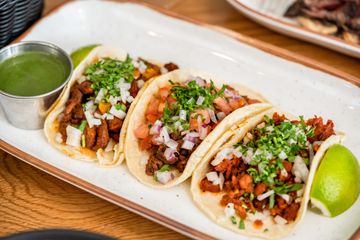Discover the flavorful taste of freshly made guacamole today
Wiki Article
Is Mexican Food Healthy And Balanced? Unpacking the Nutritional Benefits of Typical Components
The question of whether Mexican food is healthy and balanced invites an expedition of its conventional active ingredients. Beans and corn work as fundamental staples, abundant in healthy protein and fiber. Avocados provide useful fats, while various herbs and flavors add flavor and health and wellness benefits - lunch and dinner. Together, these parts create a tapestry of nourishment. The healthiness of Mexican cuisine typically depends on prep work techniques and portion sizes. What role do these variables play in establishing its general dietary value?The Power of Beans: Healthy Protein and Fiber-Rich Staples
Commonly overlooked, beans serve as a foundation of Mexican cuisine, supplying a wealth of dietary advantages. Rich in healthy protein, they are an outstanding plant-based option for those looking for to fulfill their nutritional healthy protein needs. This high protein content supports muscular tissue repair service and development, making beans vital for both vegetarians and meat-eaters alike. In addition, beans are a phenomenal source of dietary fiber, which aids in food digestion and promotes a sensation of volume, potentially aiding with weight administration.The selection of beans used in Mexican recipes, such as black beans, pinto beans, and kidney beans, adds to a diverse flavor profile and can boost meals nutritionally. Moreover, beans are reduced in fat and consist of necessary vitamins and minerals, consisting of magnesium, folate, and iron. With each other, these qualities make beans a critical active ingredient, providing both nutrients and nutrition in conventional Mexican fare.

Corn: a Versatile Grain With Nutritional Perks
Corn sticks out as a flexible grain essential to Mexican cuisine, commemorated not just for its cooking applications but likewise for its impressive dietary profile. As a key ingredient in recipes like tortillas, tamales, and pozole, corn supplies essential nutrients that add to a well balanced diet. Rich in carbohydrates, it serves as a considerable energy source, while likewise being reduced in fat, making it a desirable choice for various dietary needs.Corn is a good resource of dietary fiber, which assists in digestion and advertises satiation. It consists of substantial amounts of vitamins such as B-complex vitamins, which are necessary for energy metabolic process. The visibility of antioxidants, especially carotenoids, adds to total health by lowering oxidative anxiety. Furthermore, corn is gluten-free, satisfying those with gluten sensitivities. Overall, the nutritional advantages of corn highlight its importance in conventional Mexican food and its role in a healthy diet.
Avocados: Healthy And Balanced Fats and Nutrients in Every Bite
Avocados play a significant duty in Mexican food, complementing dishes with their luscious texture and abundant taste. Past their culinary allure, avocados are celebrated for their excellent dietary account. They are an abundant source of healthy and balanced monounsaturated fats, which can assist reduced bad cholesterol degrees and support heart wellness. Furthermore, avocados are loaded with essential minerals and vitamins, consisting of potassium, vitamin E, and B vitamins, adding to general health.The high fiber content in avocados help food digestion and advertises satiety, making them you can check here an advantageous addition to any type of dish. Their unique nutrient composition can additionally sustain skin health and wellness and offer anti-inflammatory advantages. Including avocados right into typical Mexican dishes or enjoying them as a standalone snack can boost both flavor and nutrition, demonstrating why they are a cherished staple in Mexican cuisine. Overall, avocados provide a scrumptious method to delight in healthy and balanced fats and essential nutrients in every bite.
Herbs and flavors: Flavorful Wellness Boosters
While delighting in the abundant flavors of Mexican cuisine, one can not ignore the essential role that spices and natural herbs play in boosting both preference and health and wellness. Ingredients such as chili, oregano, and cilantro peppers not just add to the dynamic flavor account but likewise supply considerable wellness advantages. Cilantro is known for its cleansing residential or commercial properties, aiding to eliminate hefty steels from the body, while oregano is loaded with anti-oxidants and possesses anti-inflammatory impacts.Chili peppers, a staple in numerous Mexican meals, contain capsaicin, which has actually been linked to boosted metabolic process and discomfort alleviation. In addition, flavors like cumin and coriander assistance digestion and may help in blood sugar policy. Incorporating these delicious health and wellness boosters right into meals not only improves the culinary experience but additionally promotes general wellness, making Mexican food not just tasty, however likewise nutritionally helpful.
Conventional Cooking Approaches: Enhancing Nourishment and Flavor
Traditional cooking methods in Mexican cuisine play an important function in enhancing both nourishment and taste, as they often focus on fresh ingredients and classic strategies. Methods such as nixtamalization, where corn is soaked and cooked mr wok in an alkaline option, not only improve the nutrient account of tortillas however also improve their digestibility - lunch and dinner. In addition, using sluggish cooking approaches, like stewing or braising, allows flavors to combine magnificently while keeping the integrity of the active ingredients
Often Asked Questions
Are Mexican Food Portions Normally Larger Than Other Cuisines?
Mexican food parts are typically bigger than those of numerous other foods. This characteristic shows standard eating methods, stressing common sharing and hearty meals, which can result in a more substantial serving dimension generally.
Just how Does the Preparation Method Affect Healthfulness of Mexican Food?
Preparation methods significantly affect the healthiness of Mexican food. Strategies such as grilling or steaming preserve nutrients, while frying can asian cuisine increase unhealthy fat web content. Choices of ingredients and cooking styles ultimately figure out total nutritional worth.Can Mexican Food Be Tailored for Details Dietary Limitations?
Mexican food can undoubtedly be customized for particular dietary limitations. Replacements, such as using corn tortillas for gluten-free diets or incorporating even more vegetables, make it possible for people to appreciate traditional flavors while suiting numerous dietary demands.What Are Common False Impressions Regarding Mexican Food and Health And Wellness?
Usual misunderstandings about Mexican food include the idea that it is naturally harmful, extremely hot, and entirely focused on fats. In truth, conventional meals frequently include healthy components and can be tailored to various nutritional needs.Are There Much Healthier Choices at Mexican Dining Establishments?
Healthier options at Mexican dining establishments usually include smoked meats, beans, and fresh vegetables. Selecting dishes that highlight entire ingredients and staying clear of hefty sauces can lead to a more healthy dining experience, advertising overall wellness.The variety of beans used in Mexican recipes, such as black beans, pinto beans, and kidney beans, adds to a diverse taste profile and can boost dishes nutritionally. Avocados play a substantial function in Mexican food, complementing dishes with their luscious texture and abundant taste. Integrating avocados right into conventional Mexican recipes or enjoying them as a standalone snack can boost both taste and nourishment, showing why they are a cherished staple in Mexican cuisine. While delighting in the abundant tastes of Mexican food, one can not ignore the essential duty that spices and natural herbs play in improving both preference and health and wellness. Traditional cooking approaches in Mexican food play an important role in boosting both nutrition and flavor, as they frequently prioritize classic techniques and fresh components.
Report this wiki page